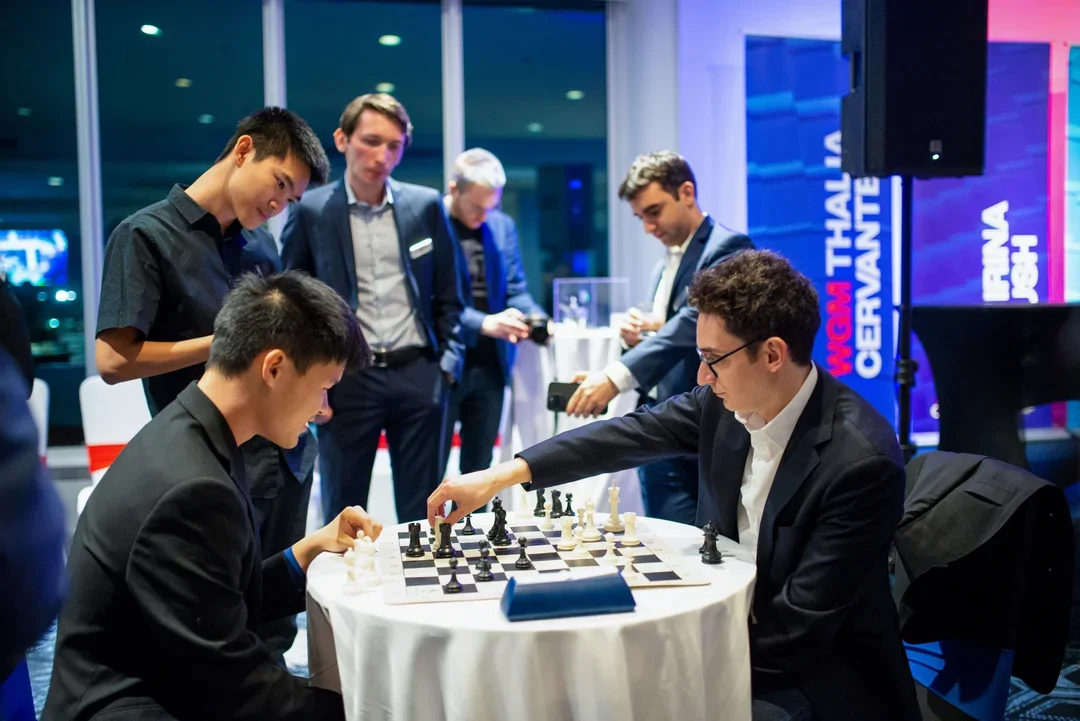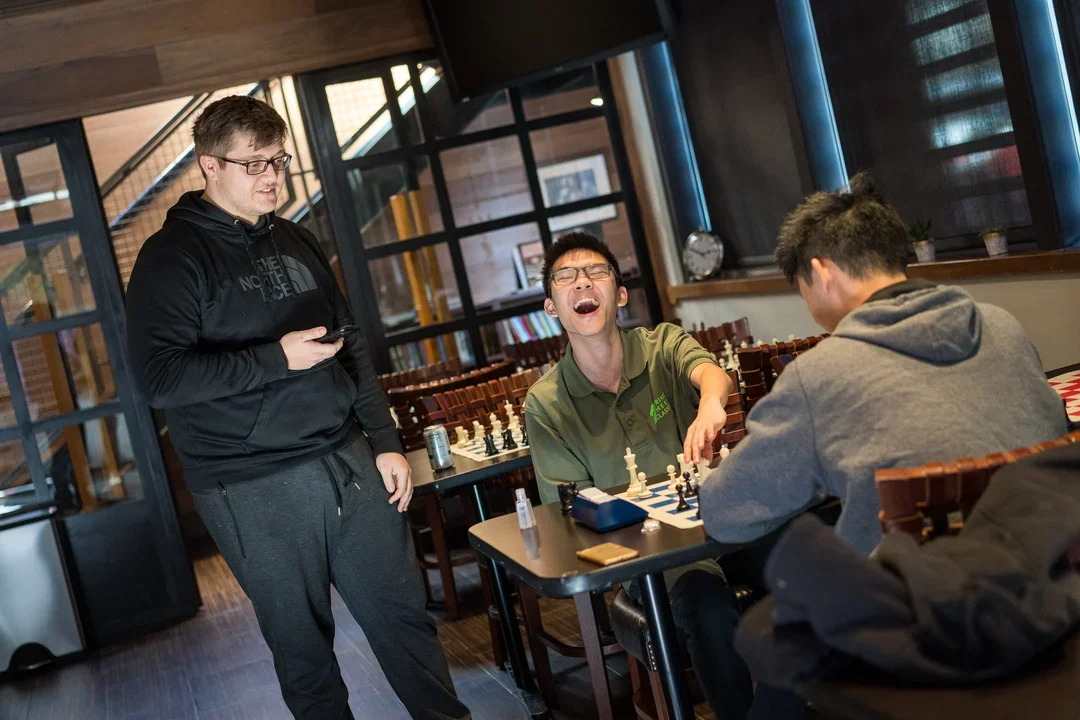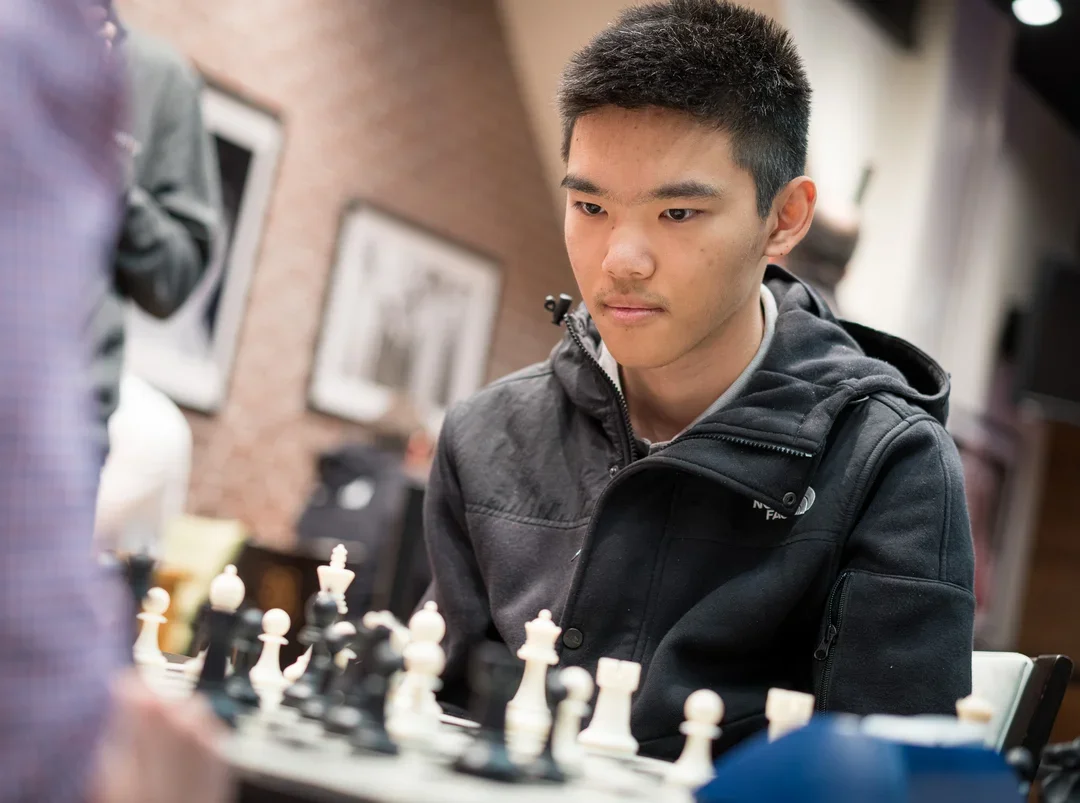Editor's note: This story first appeared in the June 2023 issue of Chess Life Kids Magazine. Consider becoming a US Chess member for more content like this — access to digital editions of both Chess Life and Chess Life Kids is a member benefit, and you can receive print editions of both magazines for a small add-on fee.
My first GM coach, Babakuli Annakov, and later, the coaches provided by Kasparov Chess Foundation such as GM Alex Chernin, provided rigorous chess training designed to grow world class players. Then and now, they tend to believe that serious chess players should not spend precious time on playful blitz games.
When I was young and just starting out in chess, my favorite things to do were playing blitz and bullet games online, along with watching GMs playing blitz on the Internet Chess Club. Now called chessclub.com, “ICC” was the place for online chess before Chess.com became the dominant online chess platform. This certainly could have been perceived as naughty by my coaches and my dad, but since my chess rating kept progressing smoothly over those years, they were not too harsh on me.

My coaches had valid reasons for thinking blitz chess was not ideal for chess development. Perhaps you have heard similar ideas from your own coaches.
Chess is a strategy game that requires thoughtful planning and in-depth analysis. In order to master chess, it is important to spend time studying and analyzing, as well as playing longer games that allow for more complex strategies and ideas to be explored. When we are at the board playing classical time control games, we need to be willing to invest time in developing plans and double check our decisions to avoid blunders, especially at critical moments of the game. Only that way can we find the best move and maximize our results.
My coaches were all of the “Soviet School” of chess, which believes that training time should be invested in developing positional understanding, long-term planning, and analytical skills. I remember days when GM Chernin gave me positions that were so complicated that it took me as much as an hour to analyze and calculate to a result. That was very beneficial in building my chess understanding and analytical muscle.

Blitz, in contrast, requires quick decisions, and relies heavily on intuition and instinct. If you spend too much time to find the best move or push an edge, you may not have enough time to convert the advantage to a win later in the game. There is incentive to avoid doing long calculation in blitz games.
The fast-paced nature of the blitz game can build bad habits in young players. The speed of the game forces us to make hasty decisions, instead of exploring different candidate moves, weighing them to identify optimal plans, and checking our ideas before touching the pieces.
Now we get to the question. Is blitz good or bad for your overall game?
I believe that young players should play blitz games as much as they want, as long as they don’t refuse their chess lessons or give up longer time control games and tournaments. My biggest reason for giving young players freedom to play blitz is this: many young players LOVE playing blitz! I know that for a fact because I am one of them. And many of my chess friends who I grew up with are the same. I have built a lot of friendships with them in the blitz games we played after national and world youth chess championships.

LOVE is the best coach of chess. Love of chess keeps us in the game. If young players lose their love for the game, they are not going to work to improve their understanding and skills, no matter how many brilliant coaches and training programs you provide them. Letting kids enjoy the game is the most important thing in chess growth.
But there are more reasons for my belief in the value of blitz. Playing blitz chess can help improve key chess skills, such as pattern recognition, tactical awareness, and speed of calculation. It can also give the player the chance to play many more games than one could get at long time controls, giving improving players exposure to more (and different) openings, while growing experience in handling all kinds of scenarios.
With today’s time controls growing faster and faster, and with rapid and blitz games increasingly used for tiebreakers, there are competitive reasons for growing skill in quick games. We have seen recent U.S. Championships go to Armageddon blitz games, and the FIDE World Cup features a knockout format where matches are often decided by rapid and blitz battles.
There was a boom in chess on the internet in 2020 after the COVID-19 pandemic started. Playing blitz on the internet became a popular activity for people staying at home, while classical time control tournaments were on hold due to the public health risk. Chess was speeding up anyway, but I think this growth of online blitz really blossomed during the pandemic. Now-former world champion Magnus Carlsen has even argued for it becoming the main form of chess. “I feel,” he said in December 2022, “that classical [chess] probably will be phased out a little bit, at least at the top level. At least that’s what I think should happen.”
There are clearly benefits to professional players with online rapid and blitz. It’s convenient (you can play from home!), there’s more prize money for less time playing, and the speed is exciting to online audiences. I have served as a commentator for many online events, and FIDE has even organized an Online Olympiad, where countries around the world compete in rapid and blitz battles.
I am certainly not discounting the importance of classical time control chess. But chess is a sport, and rapid and blitz can be a good way to determine a winner between two evenly matched players in classical time control matches. Having strong blitz skills can really come in handy in those situations, and of course, blitz is a lot of fun too!
So if your coaches or parents come over and scold you for playing blitz, you can tell them that I gave you permission (and a few good reasons) to play! LOL!
Categories
Archives
- January 2026 (6)
- December 2025 (27)
- November 2025 (29)
- October 2025 (39)
- September 2025 (27)
- August 2025 (29)
- July 2025 (43)
- June 2025 (25)
- May 2025 (24)
- April 2025 (29)
- March 2025 (29)
- February 2025 (20)
- January 2025 (24)
- December 2024 (34)
- November 2024 (18)
- October 2024 (35)
- September 2024 (23)
- August 2024 (27)
- July 2024 (44)
- June 2024 (27)
- May 2024 (31)
- April 2024 (51)
- March 2024 (34)
- February 2024 (25)
- January 2024 (26)
- December 2023 (29)
- November 2023 (26)
- October 2023 (37)
- September 2023 (27)
- August 2023 (37)
- July 2023 (47)
- June 2023 (33)
- May 2023 (37)
- April 2023 (45)
- March 2023 (37)
- February 2023 (28)
- January 2023 (31)
- December 2022 (23)
- November 2022 (32)
- October 2022 (31)
- September 2022 (19)
- August 2022 (39)
- July 2022 (32)
- June 2022 (35)
- May 2022 (21)
- April 2022 (31)
- March 2022 (33)
- February 2022 (21)
- January 2022 (27)
- December 2021 (36)
- November 2021 (34)
- October 2021 (25)
- September 2021 (25)
- August 2021 (41)
- July 2021 (36)
- June 2021 (29)
- May 2021 (29)
- April 2021 (31)
- March 2021 (33)
- February 2021 (28)
- January 2021 (29)
- December 2020 (38)
- November 2020 (40)
- October 2020 (41)
- September 2020 (35)
- August 2020 (38)
- July 2020 (36)
- June 2020 (46)
- May 2020 (42)
- April 2020 (37)
- March 2020 (60)
- February 2020 (38)
- January 2020 (45)
- December 2019 (34)
- November 2019 (35)
- October 2019 (42)
- September 2019 (45)
- August 2019 (56)
- July 2019 (44)
- June 2019 (35)
- May 2019 (40)
- April 2019 (48)
- March 2019 (61)
- February 2019 (39)
- January 2019 (30)
- December 2018 (29)
- November 2018 (51)
- October 2018 (45)
- September 2018 (29)
- August 2018 (49)
- July 2018 (35)
- June 2018 (31)
- May 2018 (39)
- April 2018 (31)
- March 2018 (26)
- February 2018 (33)
- January 2018 (30)
- December 2017 (26)
- November 2017 (24)
- October 2017 (30)
- September 2017 (30)
- August 2017 (31)
- July 2017 (28)
- June 2017 (32)
- May 2017 (26)
- April 2017 (37)
- March 2017 (28)
- February 2017 (30)
- January 2017 (27)
- December 2016 (29)
- November 2016 (24)
- October 2016 (32)
- September 2016 (31)
- August 2016 (27)
- July 2016 (24)
- June 2016 (26)
- May 2016 (19)
- April 2016 (30)
- March 2016 (36)
- February 2016 (28)
- January 2016 (32)
- December 2015 (26)
- November 2015 (23)
- October 2015 (16)
- September 2015 (28)
- August 2015 (28)
- July 2015 (6)
- June 2015 (1)
- May 2015 (2)
- April 2015 (1)
- February 2015 (3)
- January 2015 (1)
- December 2014 (1)
- July 2010 (1)
- October 1991 (1)
- August 1989 (1)
- January 1988 (1)
- December 1983 (1)







